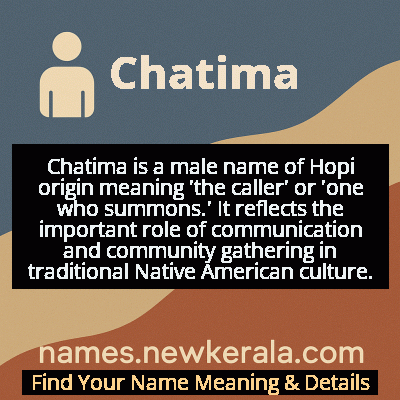Chatima Name Meaning & Details
Origin, Popularity, Numerology Analysis & Name Meaning of Chatima
Discover the origin, meaning, and cultural significance of the name CHATIMA. Delve into its historical roots and explore the lasting impact it has had on communities and traditions.
Name
Chatima
Gender
Male
Origin
American
Lucky Number
1
Meaning of the Name - Chatima
Chatima is a male name of Hopi origin meaning 'the caller' or 'one who summons.' It reflects the important role of communication and community gathering in traditional Native American culture.
Chatima - Complete Numerology Analysis
Your Numerology Number
Based on Pythagorean Numerology System
Ruling Planet
Sun
Positive Nature
Leaders, ambitious, highly driven, self-reliant, innovative.
Negative Traits
Overly aggressive, domineering, impatient, selfish.
Lucky Colours
Red, orange, gold.
Lucky Days
Sunday.
Lucky Stones
Ruby, garnet.
Harmony Numbers
2, 3, 9.
Best Suited Professions
Entrepreneurs, managers, engineers.
What People Like About You
Courage, determination, leadership.
Famous People Named Chatima
Chatima Talayumptewa
Hopi Elder and Cultural Preservationist
Led efforts to document and preserve traditional Hopi oral histories and ceremonies
Chatima Koinva
Environmental Activist
Founded the Hopi Water Protection Alliance to safeguard sacred water sources
Chatima Nuvamsa
Educator and Author
Developed bilingual educational materials integrating Hopi language and cultural teachings
Chatima Sekaquaptewa
Artist and Storyteller
Created renowned pottery and visual art that interprets traditional Hopi symbolism for modern audiences
Name Variations & International Equivalents
Click on blue names to explore their detailed meanings. Gray names with will be available soon.
Cultural & Historical Significance
In contemporary Native American contexts, Chatima serves as a powerful symbol of cultural resilience and identity preservation. As indigenous communities navigate the challenges of modernization while maintaining traditional values, names like Chatima become anchors to ancestral knowledge and practices. The name reflects the ongoing importance of community cohesion and spiritual responsibility in a changing world. For many Hopi families, choosing this name represents a commitment to passing down cultural roles and responsibilities to new generations, ensuring that the vital functions of community leadership and spiritual guidance continue to thrive.
Extended Personality Analysis
Individuals bearing the name Chatima typically exhibit personality traits aligned with their name's meaning of 'the caller' or summoner. They often demonstrate natural leadership qualities combined with exceptional communication skills, making them effective at bringing people together and facilitating group activities. Chatimas tend to be organized, responsible individuals who understand the importance of proper protocols and timing in both social and professional contexts. Their ability to listen attentively while also expressing themselves clearly makes them valuable mediators and community organizers.
Beyond their communicative strengths, Chatimas often display a deep sense of spiritual awareness and cultural responsibility. They may feel a calling to preserve traditions and maintain connections between past and present. This can manifest as a thoughtful, contemplative nature balanced with practical action. While they can be assertive when necessary, they typically lead through consensus-building rather than authoritarian methods. Their strength lies in understanding group dynamics and knowing when and how to bring people together for common purposes. Many Chatimas find fulfillment in roles that allow them to serve as bridges—between generations, between different community factions, or between traditional and modern ways of life.
Modern Usage & Popularity
In modern times, Chatima remains predominantly used within Native American communities, particularly among Hopi families committed to preserving their cultural heritage. The name represents a conscious choice to maintain indigenous naming traditions in an era where many Native names have been lost or Anglicized. While not commonly found on national baby name charts, Chatima has seen steady usage within indigenous communities and occasional adoption by non-Native parents seeking meaningful, culturally significant names. The name's modern usage reflects broader trends toward cultural preservation and the reclamation of indigenous identity. Contemporary bearers often navigate dual roles—honoring traditional responsibilities associated with the name while engaging with modern education, careers, and social contexts. The name's continued use demonstrates the resilience of Hopi cultural practices and the importance placed on maintaining linguistic and spiritual connections to ancestral traditions.
Symbolic & Spiritual Meanings
Symbolically, Chatima represents the profound power of voice, community, and spiritual invocation in human experience. The name embodies the concept of calling forth—not just in the literal sense of summoning people, but in the deeper meaning of invoking spiritual presence, calling attention to important matters, and calling communities to their highest purposes. It symbolizes the essential role of communication in maintaining social cohesion and cultural continuity. Metaphorically, Chatima represents the bridge between individual consciousness and collective awareness, between human needs and spiritual guidance. The name carries connotations of responsibility, leadership, and the sacred duty of maintaining proper relationships—between people, between generations, and between humanity and the spiritual world. In a broader sense, Chatima symbolizes the human capacity to call into being that which is needed for community wellbeing and spiritual fulfillment.

